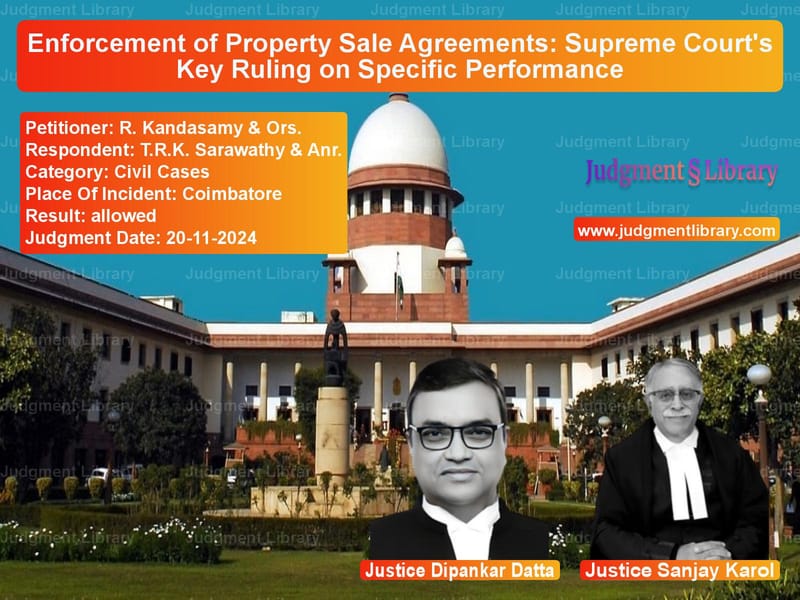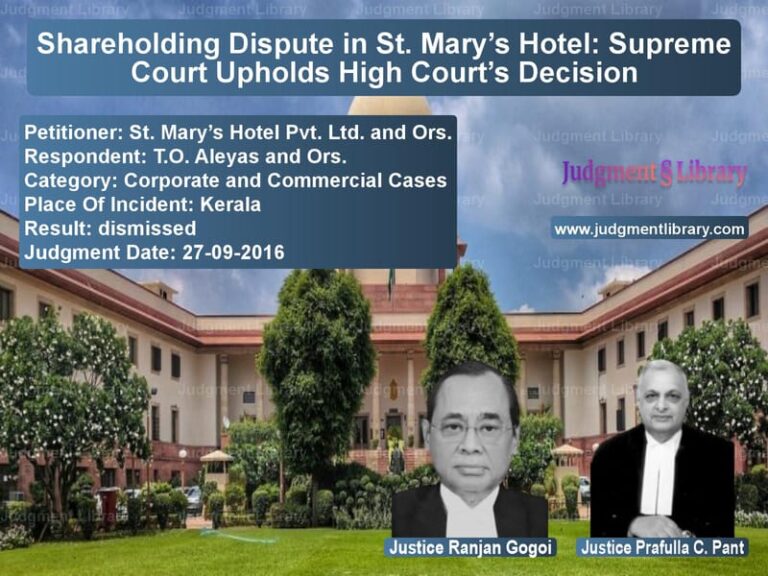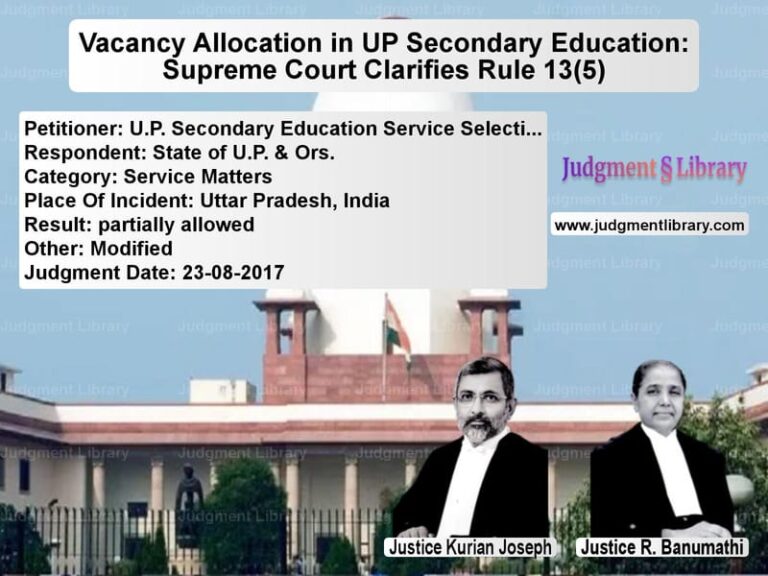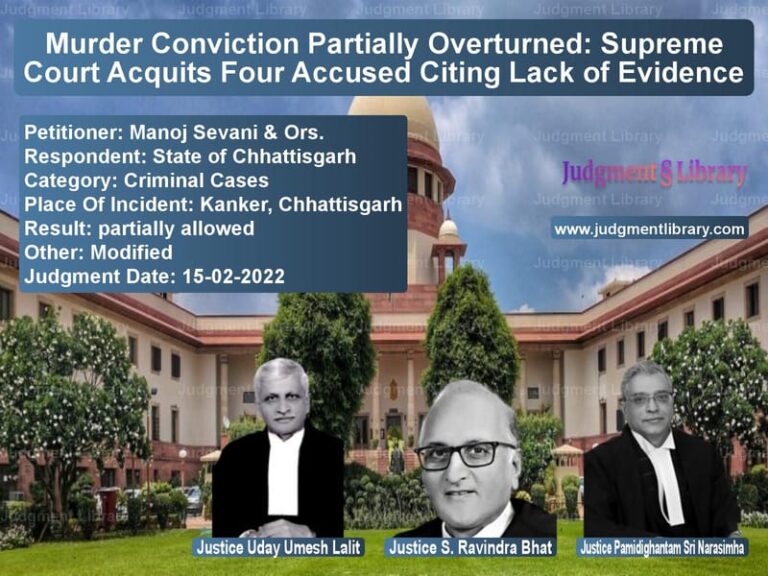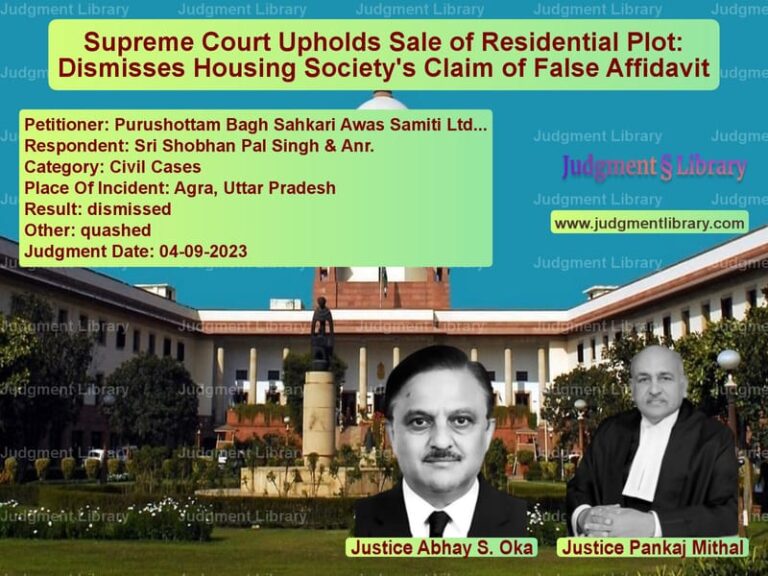Enforcement of Property Sale Agreements: Supreme Court’s Key Ruling on Specific Performance
In a significant ruling, the Supreme Court of India addressed a long-standing dispute in the case of R. Kandasamy & Ors. vs. T.R.K. Sarawathy & Anr., along with M/S. ABT Limited vs. T.R.K. Sarawathy & Ors.. This case dealt with the specific performance of a contract for the sale of immovable property and whether time was of the essence in such agreements. The Court had to determine whether the buyers were ready and willing to complete the transaction and whether the cancellation of the agreement by the sellers was justified.
The litigation originated from an agreement for sale dated January 20, 2005, between the parties concerning a tenanted property. While the buyers contended that the sellers failed to perform their obligations, including delivering vacant possession, the sellers argued that the buyers were not diligent in making payments and completing the sale within the agreed time.
Background and Dispute
The agreement stipulated the following key conditions:
- The buyer agreed to purchase the property for Rs. 2.3 crore.
- An advance of Rs. 10 lakh was paid at the time of agreement.
- The remaining balance was to be paid within four months.
- The sellers undertook to vacate the tenants before transferring possession.
The dispute arose when the sellers canceled the agreement on February 23, 2006, citing non-payment by the buyer and returned the advance amount. The buyer challenged this cancellation, claiming that the timeline for performance started only after the last tenant vacated the property in February 2006.
Trial Court and High Court Decisions
The case was initially heard by the Trial Court, which ruled against the buyer, stating that she had not demonstrated readiness and willingness to perform her part of the contract. However, on appeal, the High Court overturned this decision, granting a decree for specific performance. The High Court observed that since the sellers had accepted payments beyond the original deadline, they had waived their right to enforce time as the essence of the contract.
Arguments Presented
Sellers’ Arguments
- The agreement explicitly required full payment within four months, making time the essence of the contract.
- The buyer failed to adhere to the timeline and showed no serious intent to complete the transaction.
- Even after multiple extensions were provided, the buyer did not complete the sale.
- The buyer was financially incapable of completing the transaction, as evidenced in cross-examination.
- The buyer did not legally challenge the agreement’s cancellation and could not now seek specific performance.
Buyer’s Arguments
- The sale depended on the sellers evicting tenants, which was completed only in February 2006.
- The sellers’ acceptance of payments beyond the initial deadline indicated that time was not the essence.
- The buyer continuously expressed readiness and willingness to complete the sale.
- The sellers failed to provide essential legal documents necessary for completing the transaction.
Supreme Court’s Analysis
The Supreme Court reviewed multiple precedents related to specific performance of contracts and examined the conduct of both parties in detail. Key findings included:
- Time is generally not the essence in property sale contracts. However, in this case, the sellers had clearly stipulated a four-month period for completion.
- Continuous readiness and willingness to perform must be demonstrated. The buyer failed to do so adequately.
- The sellers’ obligation to vacate tenants did not extend the payment deadline. The buyer was expected to pay the balance amount within the agreed timeframe.
- The buyer’s actions, such as delayed responses and failure to return the advance promptly, indicated a lack of seriousness.
Legal Precedents Considered
The Supreme Court referred to multiple previous rulings to clarify its stance:
- In Chand Rani v. Kamal Rani, it was established that time is generally not the essence in real estate contracts unless explicitly mentioned.
- In Saradamani Kandappan v. S. Rajalakshmi, the Court observed that economic conditions and price fluctuations must be considered when granting specific performance.
- In Ferrodous Estates (P) Ltd v. P. Gopirathnam, the Court ruled that dishonest conduct by sellers could justify specific performance in favor of buyers.
Supreme Court’s Verdict
The Supreme Court ruled in favor of the sellers, overturning the High Court’s decision. The Court found that:
- The buyer failed to demonstrate continuous readiness and willingness to complete the transaction.
- The sellers were within their rights to cancel the agreement due to non-compliance by the buyer.
- The High Court erred in granting specific performance without considering the buyer’s financial incapacity.
- The buyer was only entitled to a refund of the Rs. 25 lakh advance payment.
Conclusion
This ruling reinforces the principle that specific performance is a discretionary remedy, not an automatic right. Courts will consider the conduct of both parties, financial readiness, and adherence to contractual terms before granting such relief. The judgment sets a precedent for enforcing property sale agreements while balancing contractual obligations and equitable considerations.
Petitioner Name: R. Kandasamy & Ors..Respondent Name: T.R.K. Sarawathy & Anr..Judgment By: Justice Dipankar Datta, Justice Sanjay Karol.Place Of Incident: Coimbatore.Judgment Date: 20-11-2024.
Don’t miss out on the full details! Download the complete judgment in PDF format below and gain valuable insights instantly!
Download Judgment: r.-kandasamy-&-ors.-vs-t.r.k.-sarawathy-&-a-supreme-court-of-india-judgment-dated-20-11-2024.pdf
Directly Download Judgment: Directly download this Judgment
See all petitions in Contract Disputes
See all petitions in Property Disputes
See all petitions in Specific Performance
See all petitions in Judgment by Dipankar Datta
See all petitions in Judgment by Sanjay Karol
See all petitions in allowed
See all petitions in supreme court of India judgments November 2024
See all petitions in 2024 judgments
See all posts in Civil Cases Category
See all allowed petitions in Civil Cases Category
See all Dismissed petitions in Civil Cases Category
See all partially allowed petitions in Civil Cases Category

